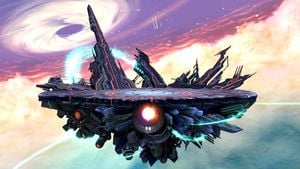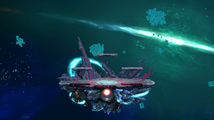Final Destination (SSBU)
| Super Smash Bros. Ultimate Final Destination | |
|---|---|
  Final Destination in Super Smash Bros. Ultimate. | |
| Universe | Super Smash Bros. |
| Appears in | Ultimate |
| Availability | Starter |
| Crate type | Normal |
| Maximum players | 8 |
| “ | Though this is a simple stage, with no stage hazards or floating platforms, the background has been updated for this game. Make sure you don't get too distracted and get defeated! | ” |
| —Super Smash Blog, Super Smash Bros. Ultimate Official Site | ||
Final Destination (終点, Endpoint) is a stage in Super Smash Bros. Ultimate. It was revealed on August 8, 2018. In World of Light, Mario, Bowser, Sheik, Marth, Snake, Villager, Mii Brawler and Mii Swordfighter's unlock battles are fought here.
Stage layout
Like its predecessors, Final Destination consists of a single platform with ledges that can be grabbed. Compared to previous iterations, it appears to have a crystalline texture with mechanical elements. Its background primarily travels through three different nebulae: a cream-colored one with a black hole, a green one with psychedelic crystalline objects floating in the background, and a fiery orange one partially obscured by blue clouds.[1] This iteration of Final Destination is shorter than in past games, now being the same length as Battlefield. This is also true of all Ω forms. Anytime the stage is loaded, it will start on a different background.
While in Vs. Mode with more than 4 players, the stage itself increases to be 1.5 times its normal size while increasing its camera boundaries and blast-lines to compensate; this is also stated as a tip in the Stage Tips Section in the game. This also affects all Ω form variations of any stage as well.
Ω form and Battlefield form
Final Destination itself can be selected as an Ω form, but doing so is identical to selecting the normal form.
The Battlefield form of Final Destination is identical to its regular form, but it has the addition of three soft platforms that are unique to this form and are based on the ones when fighting Galeem and/or Dharkon in World of Light. It is also used when fighting 50 false characters as Master Hand in World of Light.
Hazards Off
Since Final Destination lacks any hazards to begin with, no changes are made when stage hazards are turned off.
As Adventure Mode: World of Light Boss Stages
While Final Destination is still used for the fights between Master Hand, Crazy Hand, and Giga Bowser, the five boss stages used for Galeem and Dharkon’s boss fights feature a platform that resembles Final Destination, but with four soft platforms arranged in a diamond formation above the stage, as well as removing all decorative features above the stage. These five stages, with the exception of the third, primarily differ from their backgrounds.
- The first fight with Galeem uses the cream-colored nebula from the playable Final Destination as its background.
- The first fight with Dharkon uses the fiery nebula from the playable Final Destination as its background.
- The Final Battle is split up into three phases, each one with a unique stage, though the starting platform remains the same throughout each phase.
- The first part of the battle features a vertical scrolling stage, similarly to Icicle Mountain and Rumble Falls from Melee and Brawl, respectively. Certain platforms contain Rocket Belts to help traverse upwards, and Maxim Tomatoes to heal damage. Four times throughout this section, the stage will stop scrolling to allow the spawning of Puppet Fighters. Fighters who were rescued in the Light Realm will be colored light blue with red eyes, while fighters that were rescued in the Dark Realm will be colored dark with a shining red look and purple eyes. The only non-DLC characters that do not appear as false characters are Kirby, Olimar, and the Mii Fighters. The light and dark puppet fighters can attack each other, and will not blow up like the false characters in Galeem and Dharkon’s boss fights, as the player has to KO them in order to move on. The first pitstop has two Light Realm fighters and two Dark Realm fighters, and each subsequent pitstop will increase the numbers of Light Realm and Dark Realm puppet fighters by two. The puppet fighters chosen for the battle will always be an equal amount of Light and Dark but are completely random otherwise. Dharkon and Galeem will try to attack the player between the first and third pitstops, respectively be either slowly advancing towards them or by destroying platforms. Attacking their cores will halt their attacks. Clearing the fourth pitstop will advance the player to the next stage.
- The second part of the final battle appears similar to the initial fights with Galeem and Dharkon, but the bosses are replaced by floating orbs that contain all of the bosses fought except for Master Hand and Crazy Hand. When an orb is hit, it will transport the player to the boss labeled on the orb. Additionally, it removes the four soft platforms, and the backgrounds from both Galeem and Dharkon's solo fights are seemingly violently colliding with each other (the light side on the right, and the dark side on the left, corresponding the each boss’s starting positions in their initial fights). Defeating Rathalos, Galleom, or Giga Bowser will cause the light background to recede and the dark background to take over, while defeating Dracula, Ganon, or Marx will cause the opposite, though the background changes are merely aesthetic. While floating around, the boss’s orbs will fire projectiles from their center at the player, prompting them to attack the orbs as soon as possible. Defeating all of the bosses will advance the player to the final battle between Galeem and Dharkon.
- The third part of the final battle is similar to the initial solo battles between Galeem and Dharkon. The stage’s background differs from that of the playable Final Destination, that being the sunset-like background seen at the end of the opening movie, though rotated so that the light half of the background is on the right side to correspond to Galeem, while the darker side is on the left to correspond to Dharkon. When either Galeem or Dharkon is close to defeat, the background changes to another unique background, being two still nebulae, one cream-colored and the other black. There are also two unique backgrounds on this stage, one each for after either Galeem or Dharkon have been defeated, but the other one is still standing. Galeem’s resembles a supernova partially obscured by peach-colored clouds, while Dharkon’s resembles dark red stormy clouds. The sunset-like background will slowly rotate, while the other three will stay still until one boss is defeated.
- When choosing to fight only Galeem or Dharkon instead of both, the final battle immediately skips to this portion. If fought when one side has more control over the other, the background will be the opposite of their previous battle. If fought after the portion when playing as Master Hand, it will only use the sunset-like background at the start of the true final battle. Aside from the background, the second solo fights are exactly like the first.
- This variant of Galeem & Dharkon’s residence is the only one that can be legitimately shown off without either Galeem or Dharkon. Namely, it is present at the end of the opening movie and Corrin’s congratulations screen.
A section of the vertical scrolling section where the player must escape Bob-ombs instead.
The sunset-like background as seen in the opening movie.
Tournament legality
Like in previous games, Final Destination is considered a legal starter stage in tournaments, owing to its simple layout and lack of any disruptive stage hazards.
Update history
- Players can now select any stage-specific music for the Final Destination stage.
Gallery
Fox holding a Black Hole item on the stage.
The Ice Climbers using Blizzard on a Metroid on the stage.
Ken using Shinryuken on the stage.
Sora on the stage.
Sora in his P8 costume and Link fighting on the stage.
Names in other languages
Trivia
- In the E3 2018 demo build of Ultimate, selecting Final Destination would load the Ω form of Battlefield instead.
- In the E3 demo, the beta version of Battlefield's music is heard in Final Destination. The E3 version of the Battlefield theme uses synth instruments, while the final version is performed live by the Smash Bros. Ultimate Orchestra.
- Playing the stage's main BGM track in reverse reveals it to be a unique variation of Lifelight.
- This is the first Final Destination stage to have background decorations above the surface of the platform.
- The blast lines of this version of Final Destination are slightly uneven, with the left side being a little further back then the right side. This results in characters being KO'd roughly 2%-4% later from the left side compared to the right.
- Nikki is the only Assist Trophy to not be compatible with this stage, probably because of her drawings blending in the background.
- Despite this, she can still be summoned in Final Destination's Battlefield form.
- This stage has the most unlockable characters battled here in the World of Light, with 8.
- Minecraft World's Ω and battlefield forms are 16 blocks wide, and Steve can place 16 Blocks along the length of these stages. Each block is 1 meter in Minecraft, meaning Final Destination, Battlefield, and all of their stage variants are 16 meters in length.
See also





























